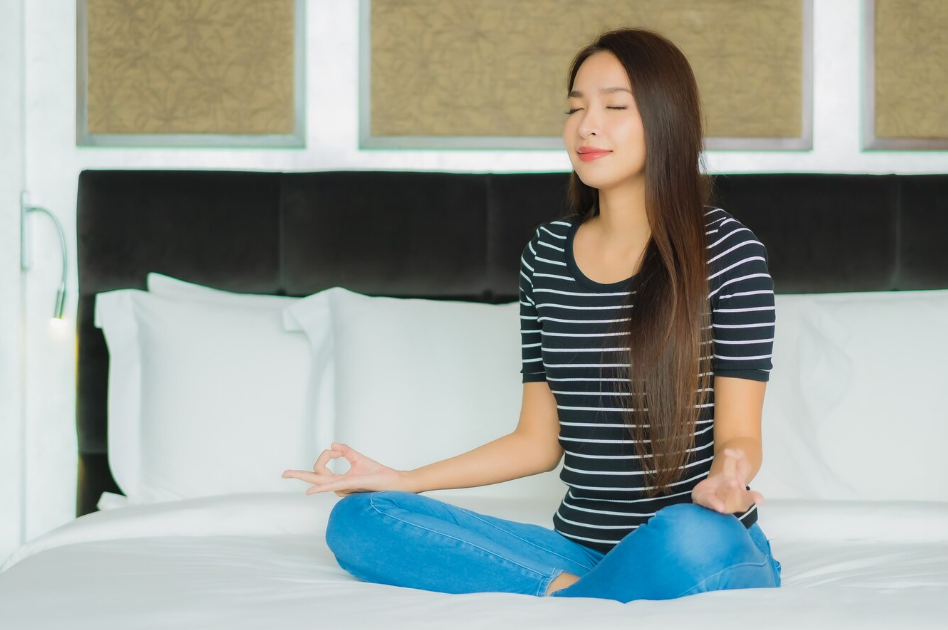Meditation to Start the Day
Learn how to start your day with meditation and how it can help you deal with stress more effectively.

Selfpause Affirmation App
Download the app to get 1,000’s of affirmation meditations and everything you need to write, record and listen to your own.
It is beneficial to meditate in the morning. It can help you deal with stress better and improve your coping mechanisms. It triggers the relaxation response in your body, which reduces damaging hormones released during prolonged fight or flight. There are many benefits of meditation. In this article, we will discuss the benefits and drawbacks of morning meditation.
Benefits of morning meditation

Meditation is a good way to start the day, as it can help you clear your mind and focus better. It can also help you reduce stress and anxiety by putting you in touch with your inner stillness. In addition to being a great way to improve your self-awareness, meditation can also increase your self-esteem and confidence. It can even help you fall asleep better, and it can lower your blood pressure and heart rate.
Regardless of whether you’re a morning person or not, you can reap the benefits of meditating every day. You won’t need to spend hours each day on it – just a few minutes of your time will do the trick. The key to making it a habit is to do it consistently. If you’re new to meditating, try setting small goals and keeping them realistic. Even if you can only manage a few minutes in the morning, meditating will help you feel less stressed, less anxious, and more positive.
Practicing morning meditation can be a great way to start the day and increase your productivity. You’ll be more focused and productive, and you’ll also be less groggy in the morning. It can also help you feel more grateful. You’ll also feel happier and more satisfied when you wake up. Morning meditation also helps you set an intention for your day and it will be easier to remember later.
Meditation is beneficial for everyone, whether you’re a stay-at-home mom or a high-powered career woman. It can even help you reduce unhealthy food cravings, as it lowers your stress levels. It can also improve your ability to think clearly, which helps you make more informed decisions.
Disadvantages of morning meditation

Meditation in the morning can have a number of benefits, including a boost to your energy levels and a calming effect on the mind. We tend to be busy when we wake up, with our minds on everything from checking our calendars to answering our cell phones. When we meditate in the morning, our mind is quieted and we’re able to make better use of our energy throughout the day.
Some studies have shown that morning meditation improves productivity and reduces feelings of anxiety, depression, and stress. It has also been shown to improve cardiovascular and neurological health. However, it is not recommended for everyone. People with certain mental health conditions should consult a physician before beginning meditation in the morning.
Many people practice morning meditation to start the day. Initially, it was part of a religious tradition. However, more people began to practice this exercise after realizing the health benefits. Nowadays, many corporations have even set aside a room specifically for meditation. While meditation is not for everyone, it can help you feel calmer, more relaxed, and able to deal with stressful situations.
Practicing meditation in the morning can be an ideal choice for those who do not have enough time to sit in silence for an extended period of time. Despite the challenges, the benefits outweigh any negatives. The benefits of meditation are long-lasting, lasting as much as seven years. However, it is important to practice it consistently.
Places to practice meditation

The first step to practicing meditation is finding a quiet spot where you can be alone without interruption. Try to find a secluded spot in your home, preferably free of distractions. Alternatively, you can try a yoga studio or a church. Some yoga studios have dedicated meditation rooms or even just benches and chairs in the hallway.
Once you have found a quiet place, try to focus on your breathing and other senses. Try not to move your lips during your practice, and stay still as long as you can. This will help you get into a deeper state of meditation. Start your meditation with long, deep breaths, and focus on a certain object, such as the flame of a candle or your breathing. When your mind wanders, try to return to your object of concentration.
Another place to practice meditation is in the middle of the day. Meditation in the middle of the day can be a good way to reflect on the day and set positive intentions. It can also help build empathy and good feelings. You may even be able to meditate in public while you’re waiting in line or at work.
The benefits of meditation are well documented. Research has shown that it can help alleviate symptoms of chronic pain, lower blood pressure, and reduce anxiety and stress. Furthermore, meditation can improve sleep, prevent the mind from wandering and improve your mental state. There are hundreds of websites and apps on the internet where you can practice meditation. Though you can meditate on your own without technology, it’s best to have someone to guide you.
There are different kinds of meditation and a few are easier to practice than others. In addition to sitting in a quiet place, you can also use other areas of your home as a place to meditate. For example, a sauna or locker room can be a good place to meditate in. Usually, people are too preoccupied with their workouts to notice you.
Techniques for meditating in a quiet space

Meditation is a practice that helps you to clear your mind and focus on the present moment. You can do this by sitting in a quiet room and relaxing your body. You can play meditation music or put on a white noise machine to help you relax. You can also use your phone to set an alarm for the morning to remind you to sit quietly and meditate. After you have selected a quiet place, close your eyes and focus on your breathing. You may also choose to scan your body and become aware of the sensations it produces.
After you’ve sat in a quiet place for a while, you may notice that your mind wanders. If this happens, simply return your attention to the breath and try again. Don’t be hard on yourself. It’s perfectly normal for your mind to wander and you should be patient.
To begin your morning meditation, you may want to begin by practicing mindful walking meditation. This practice involves slowing down your pace and focusing on your feet and legs. You may even wish to repeat an action word as you walk. As you walk, you can also focus on the sights, sounds, and smells around you as you walk. This technique is probably the most familiar and widespread of all meditations and is practiced in most faith traditions.
The most important aspect of meditation is focused attention. This helps clear the mind and eliminate distractions. You may want to choose a specific object to focus on, a sound, or a mantra. Breathing is also an important component. During this practice, you will relax your body and breathe deeply and evenly. Relaxed breathing will help you slow down your breathing and reduce the use of your shoulder and upper chest muscles.
Challenges of morning meditation

Practicing morning meditation can have many benefits. It can reduce the effects of early morning stress and help you prepare for the day ahead. It can also help you manage emotions and temptations during the day. Meditation can also improve your mood and focus, enabling you to tackle tasks with enthusiasm and complete them quickly. These benefits will make you more productive and will improve your work satisfaction.
One of the most popular morning meditation practices is a five-minute practice. This form of meditation is simple and requires no special skills. It involves simply focusing on your breathing. Unlike guided meditation, this form of meditation does not require any special knowledge about the brain. You just need to set an alarm and be mindful of your breath.
Morning meditation helps you to purify your mind and body, increasing your energy levels and promoting a sense of wellness. It allows you to reflect on your goals and intentions for the day. It helps you to focus on the good things in your life instead of focusing on the negative ones. It also helps you to reduce stress and anxiety.
Some people find it difficult to start meditation in the morning. Not having enough time or space for it is a common obstacle. However, regular practice of morning meditation can turn your whole day around. It will also help you sleep better at night. So try to make time for it each morning.
If you do not have time to meditate in the morning, try to meditate for at least 5 minutes a day. Even a five-minute practice can help you start your day with more clarity and fewer stressors. Eventually, you will feel more relaxed and happy than before.
Our Top FAQ's
There are many potential benefits to meditating in the morning, including reduced stress and improved focus and productivity throughout the day. Some people also find that starting the day with a meditation practice can help to set a positive tone for the rest of the day.
To create a daily meditation routine, first choose a time that works for you and try to stick to it every day. It can be helpful to choose a quiet, comfortable space to meditate in, and to have a cushion or chair to sit on. Start by setting a timer for a short period of time, such as 5-10 minutes, and focus on your breath or a mantra as you sit quietly. Gradually increase the length of your meditation sessions over time as you become more comfortable with the practice.
Some effective techniques for morning meditation include focusing on the breath, using a mantra or word, or practicing mindfulness meditation. It can also be helpful to engage the senses, such as by focusing on the sensation of the breath in the nostrils or the feeling of the body against the floor or chair.
The length of time that you should meditate in the morning will depend on your individual goals and schedule. Some people find that a short 5-10 minute session is sufficient, while others may prefer to meditate for longer periods of time. It is generally recommended to start with shorter sessions and gradually increase the length over time as you become more comfortable with the practice.
There are generally no significant drawbacks or risks to starting the day with meditation, as long as it is practiced in a safe and healthy way. It is important to listen to your body and to stop the practice if you feel uncomfortable or distressed. Some people may find that they have difficulty quieting their mind at first, but this can often be overcome with practice and patience.
